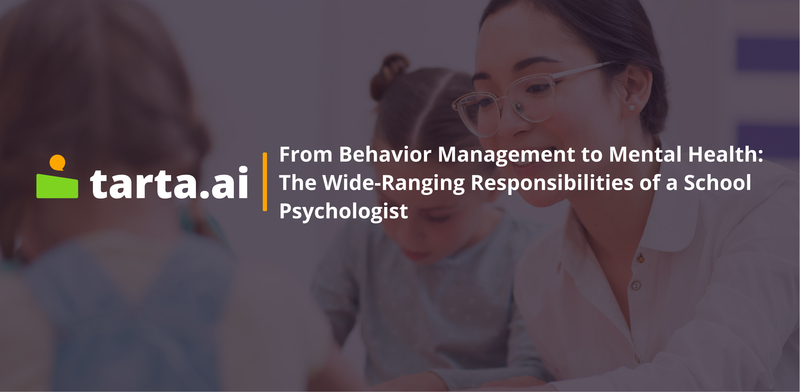From Behavior Management to Mental Health: The Wide-Ranging Responsibilities of a School Psychologist

- School psychologists have a wide range of responsibilities, including behavior management, mental health support, academic support, consultation and collaboration, conducting research, cultural competence, trauma-informed care, prevention and early intervention, and advocacy.
- They work closely with teachers, administrators, and families to promote the mental health and well-being of students, create a positive and safe learning environment, and ensure that all students have access to the support and resources they need to succeed.
- School psychologists must be knowledgeable about the diverse backgrounds and unique needs of the students they serve, and they must stay current with the latest research and best practices in the field.
School psychologists are key players in the education system. They play a vital role in promoting the mental health and well-being of students, as well as helping teachers and administrators ensure a positive and safe learning environment. This article will explore the many responsibilities of a school psychologist and the impact they can have on students and their communities.
Behavior Management
One of the primary responsibilities of school psychologists is behavior management. They work closely with teachers, administrators, and parents to identify and address problem behaviors that may be hindering a student's success in the classroom. This may include implementing positive behavior support strategies, providing individual or group counseling, and creating behavior plans. In addition, school psychologists may also conduct assessments to determine the underlying causes of problem behaviors, such as learning disabilities, attention-deficit/hyperactivity disorder (ADHD), or mental health issues.
Interesting fact: School psychologists have been around since the early 1900s, but their role has evolved over time to meet the changing needs of students and schools.
Mental Health
In addition to behavior management, school psychologists also play a critical role in promoting the mental health of students. They provide individual and group counseling, as well as crisis intervention services. School psychologists are trained to identify and treat a variety of mental health concerns, including anxiety, depression, and behavioral disorders. They work closely with families and other mental health professionals to ensure that students receive the support and treatment they need.
Academic Support
School psychologists are also responsible for providing academic support to students. They may work with teachers and administrators to develop and implement interventions to improve student performance and address learning difficulties. They may also conduct assessments to determine the presence of learning disabilities, such as dyslexia, and make recommendations for accommodations and support.
Consultation and Collaboration
In addition to direct services, school psychologists also play an important role as consultants and collaborators. They work closely with teachers, administrators, and families to support students and address concerns. School psychologists may also provide professional development and training for teachers and staff on topics such as classroom management, positive behavior support, and mental health.
Conducting research and staying current with developments in the field
School psychologists are also responsible for staying current with the latest research and best practices in the field. This may involve conducting research on effective interventions for students, participating in ongoing professional development, and attending conferences and workshops to stay up-to-date with the latest developments in school psychology.
Cultural Competence
In today's diverse educational landscape, school psychologists must have a strong understanding of the cultural and ethnic backgrounds of the students they serve. They must be able to effectively communicate and connect with students from diverse backgrounds and address any cultural biases that may impact the students' learning and well-being. School psychologists must also be knowledgeable about the unique challenges and needs of diverse student populations, such as English language learners, and provide appropriate support and resources.
Trauma-Informed Care
Many students come to school with a history of trauma and exposure to violence, abuse, and neglect. School psychologists play a critical role in providing trauma-informed care to these students. They work with teachers and administrators to create a safe and supportive learning environment, and provide individual and group counseling to address the effects of trauma. School psychologists are also trained to recognize the signs of trauma and respond in an appropriate and compassionate manner.
Prevention and Early Intervention
Prevention and early intervention are key components of a school psychologist's role. They work to promote mental health and well-being by providing educational and support services, such as individual and group counseling, that can help students overcome challenges before they escalate into more serious problems. School psychologists also work with teachers and administrators to create programs and policies that promote positive school climates, prevent bullying and violence, and foster resilience in students.
Advocacy
School psychologists are advocates for students and their families. They work to ensure that all students have access to the support and resources they need to succeed, and they play an important role in advocating for policies and programs that promote student well-being and academic success. School psychologists also advocate for the rights and needs of students with disabilities, and work to ensure that these students receive the accommodations and support they need to succeed in the classroom.
In conclusion, the role of a school psychologist is wide-ranging and complex, requiring a deep understanding of child development, mental health, and the educational system. School psychologists play a critical role in promoting the well-being of students, supporting their academic success, and creating safe and supportive learning environments.